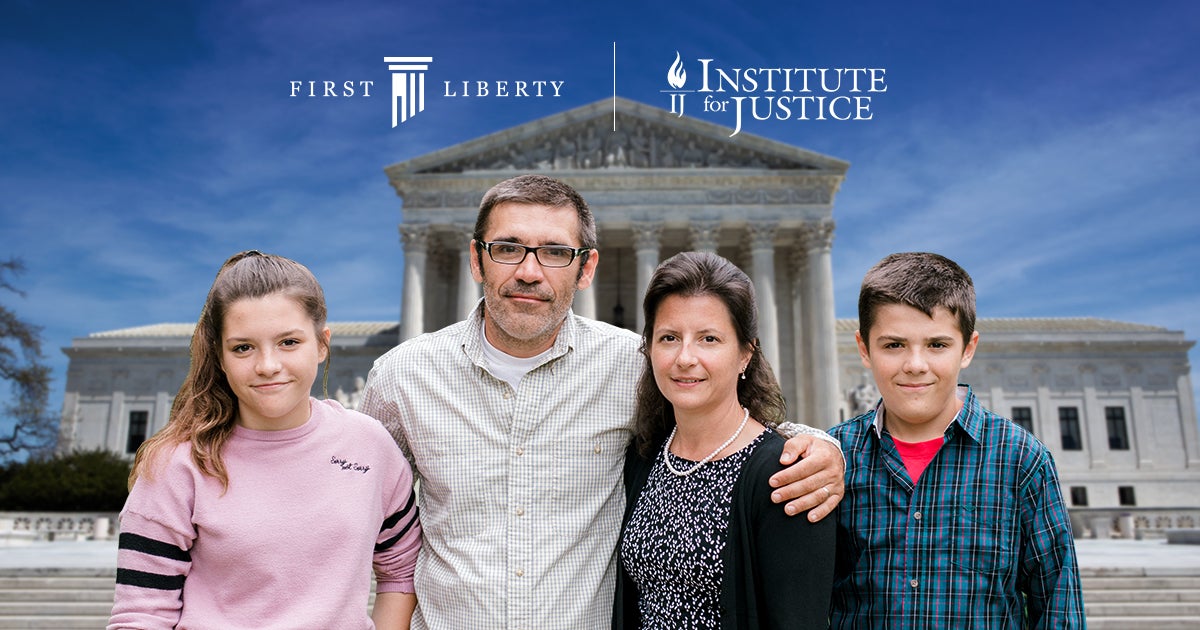
Last week, the U.S. Supreme Court agreed to hear a potentially landmark case challenging a Maine law that bans families from participating in a student-aid program if they choose to send their children to religious schools.
The Institute for Justice (IJ), along with First Liberty as co-counsel, represents the parents in Carson v. Makin, and will argue the case in the Supreme Court’s 2021-22 term.
Let’s quickly recap what this case is about, including what implications the final decision could have for the liberty of students (as well as their parents) to choose which school they attend and whether they’ll face discrimination for pursuing a faith-based education.
Choose Your School—Unless it’s Religious
Maine has a 200-plus year tradition of using government funds to ensure education for its residents. Historically, some towns would provide for families to send their children to private academies, often run by religious organizations.
In 1903, the state passed a law ensuring that all children would have access to primary and secondary education. But not every community had enough money—or students—to justify building their own schools.
To this day, when a school district does not provide a public high school, Maine compensates for this by helping fund tuition at any public or private school that families choose, unless it is a religious school. This religious restriction wasn’t always there, though. Throughout most of the program’s history, parents could choose religious schools and still participate in the tuition program.
That changed in the 1980s, when Maine’s Attorney General declared that it was unconstitutional to include religious schools in the program. Later Supreme Court cases clarified that allowing school-choice program participants to select religious educational options did not violate the Establishment Clause. Allowing families to independently choose from an array of schools which may or may not be religious in no way violates the Constitution.
However, Maine did not remove the religious exclusion from its program. Despite previous lawsuits, Maine continued to deny families in “tuitioning towns” the choice to send their child to a religiously affiliated school under the school choice program.
Hope for Victory: What the U.S. Supreme Court Has Already Said
Looking ahead to the upcoming oral argument before the Supreme Court, there’s reason to have hope that First Liberty’s and IJ’s legal teams can achieve a victory on behalf of the families we represent who are challenging Maine’s religious discrimination.
In fact, the Supreme Court recently issued two decisions favorable to the constitutional rights of students and religious schools.
The first is Trinity Lutheran v. Comer (2017). Trinity Lutheran Church in Missouri applied in 2012 for a state program that used recycled tires to pad its playgrounds. The church runs a pre-school, but not all the students attended the church. The playground is also open to everyone in the community. Still, the state refused to let Trinity Lutheran Church improve the safety of its playground via the state program. Why? Because it was religious.
In 2017, the U.S. Supreme Court ruled 7-2 that religious organizations such as Trinity Lutheran could participate equally in taxpayer-funded state programs. In fact, by excluding Trinity Lutheran, the state of Missouri was discriminating on the basis of religion and violating the Constitution.
The second favorable ruling for religious liberty came in 2020, when the Institute for Justice won the landmark Supreme Court victory in Espinoza v. Montana Department of Revenue. In that case, the Court held that states cannot bar families participating in student-aid programs from choosing religiously affiliated schools for their children. The Court held that discrimination based on the religious “status,” or identity, of a school violates the Constitution.
In light of these precedents, First Liberty and IJ argue not only that the U.S. Supreme Court has given the green light to include religious options in a school choice program, but also that barring parents who choose religious options from participating in school choice programs violates the U.S. Constitution’s Free Exercise and Equal Protection Clauses.
With the Maine School Choice case, the U.S. Supreme Court has a prime opportunity to reaffirm that in America, families should not be excluded from participating in widely available public benefits only because they choose religious schools for their children.
Supreme Court Will Hear Potentially Landmark Maine School Choice Case | News | First Liberty


No comments:
Post a Comment